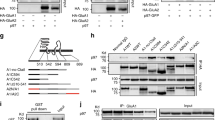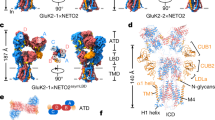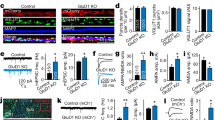Abstract
PHOSPHORYLATION of molecules involved in synaptic transmission by multifunctional protein kinases modulates both pre- and post-synaptic events in the central nervous system1,2. The positioning of kinases near their substrates may be an important part of the regulatory mechanism. The A-kinase-anchoring proteins (AKAPs; ref. 3) are known to bind the regulatory subunit of cyclic AMP-dependent protein kinase A with nanomolar affinity4–6. Here we show that anchoring of protein kinase A by AKAPs is required for the modulation of α-amino-3-hydroxy-5-methyl-4-isoxazole-propionic acid (AMPA)/kainate channels4,5. Intracellular per-fusion of cultured hippocampal neurons with peptides derived from the conserved kinase binding region of AKAPs prevented the protein kinase A-mediated regulation of AMPA/kainate currents as well as fast excitatory synaptic currents. This effect could be overcome by adding the purified catalytic subunit of protein kinase. A control peptide lacking kinase-binding activity had no effect. To our knowledge, these results provide the first evidence that anchoring of protein kinase A is crucial in the regulation of synaptic function.
This is a preview of subscription content, access via your institution
Access options
Subscribe to this journal
Receive 51 print issues and online access
$199.00 per year
only $3.90 per issue
Buy this article
- Purchase on Springer Link
- Instant access to full article PDF
Prices may be subject to local taxes which are calculated during checkout
Similar content being viewed by others
References
Greengard, P., Valtorta, F., Czernik, A. J. & Benfenati, F. Science 259, 780–784 (1993).
Levitan, I. A. Rev. Neurosci. 11, 119–136 (1988).
Carr, D. W., Stofko-Hahn, R. E., Fraser, I. D. C., Cone, R. D. & Scott, J. D. J. biol. Chem. 267, 16816–16823 (1992).
Bregman, D. B., Bhattacharyya, N. & Rubin, C. S. J. biol. Chem. 264, 4648–4656 (1989).
Carr, D. W. et al. J. biol. Chem. 266, 14188–14192 (1991).
Carr, D. W., Hausken, Z. E., Fraser, I. D. C., Stofko-Hahn, R. E. & Scott, J. D. J. biol. Chem. 267, 13376–13382 (1992).
Wang, L.-Y., Salter, M. W. & MacDonald, J. F. Science 253, 1132–1135 (1991).
Greengard, P., Jen, J., Nairn, A. C. & Stevens, C. F. Science 253, 1135–1138 (1991).
Swope, S., Moss, S. J., Blackstone, C. D. & Huganir, R. L. FASEB 6, 2514–2523 (1992).
Uhler, M. D., Chrivia, J. C. & McKnight, G. S. J. biol. Chem. 261, 15360–15363 (1986).
Hofmann, F., Beavo, J. A., Bechtel, P. J. & Krebs, E. G. J. biol. Chem. 250, 7795–7801 (1975).
Barsony, J. & Marks, S. J. Proc. natn. Acad. Sci. U.S.A. 87, 1188–1192 (1990).
Bacskai, B. J. et al. Science 260, 222–226 (1993).
Rubin, C. S., Rangel-Aldao, R., Sarkar, D., Ehrlichman, J. & Fleischer, N. J. biol. Chem. 254, 3797–3805 (1979).
Corbin, J. D., Keely, S. L. & Park, C. R. J. biol. Chem. 250, 218–225 (1975).
Patneau, D. K. & Mayer, M. L. J. Neurosci. 10, 2385–2399 (1990).
Gasic, G. P. & Hollmann, M. A. Rev Physiol. 54, 507–536 (1992).
Sommer, B. & Seeburg, P. Trends pharmac. Sci. 13, 291–296 (1992).
Egebjerg, J., Bettler, B., Hermans-Borgmeyer, I. & Heinemann, S. Nature 351, 745–748 (1991).
Wang, L.-Y., Taverna, F. A., Huang, X.-P., MacDonald, J. F. & Hampson, D. R. Science 259, 1173–1175 (1993).
Raymond, L. A., Blackstone, C. D. & Huganir, R. L. Nature 361, 637–641 (1993).
Keller, B. U., Hollmann, M., Heinemann, S. & Konnerth, A. EMBO. J. 11, 891–896 (1992).
Chavez-Noriega, L. E. & Stevens, C. F. Brain Res. 574, 85–92 (1992).
Threurfauf, W. & Vallee, R. J. biol. Chem. 257, 3284–3290 (1982).
De Camilli, P., Moretti, M., Donini, S. D., Walter, U. & Lohmann, S. M. J. Cell Biol. 103, 189–203 (1986).
Glantz, S. B., Amat, J. A. & Rubin, C. S. Molec. Biol. Cell 3, 1215–1228 (1992).
Hubbard, M. J. & Cohen, P. Trends biochem. Sci. 18, 172–177 (1993).
Legendre, P. & Westbrook, G. L. J. Physiol., Lond. 429, 429–449 (1990).
Rosenmund, C. & Westbrook, G. L. J. Physiol., Lond. 470, 705–729 (1993).
Author information
Authors and Affiliations
Rights and permissions
About this article
Cite this article
Rosenmund, C., Carr, D., Bergeson, S. et al. Anchoring of protein kinase A is required for modulation of AMPA/kainate receptors on hippocampal neurons. Nature 368, 853–856 (1994). https://doi.org/10.1038/368853a0
Received:
Accepted:
Issue Date:
DOI: https://doi.org/10.1038/368853a0
This article is cited by
-
σ-1 Receptor Inhibition of ASIC1a Channels is Dependent on a Pertussis Toxin-Sensitive G-Protein and an AKAP150/Calcineurin Complex
Neurochemical Research (2015)
-
Heart failure-specific changes in protein kinase signalling
Pflügers Archiv - European Journal of Physiology (2014)
Comments
By submitting a comment you agree to abide by our Terms and Community Guidelines. If you find something abusive or that does not comply with our terms or guidelines please flag it as inappropriate.



